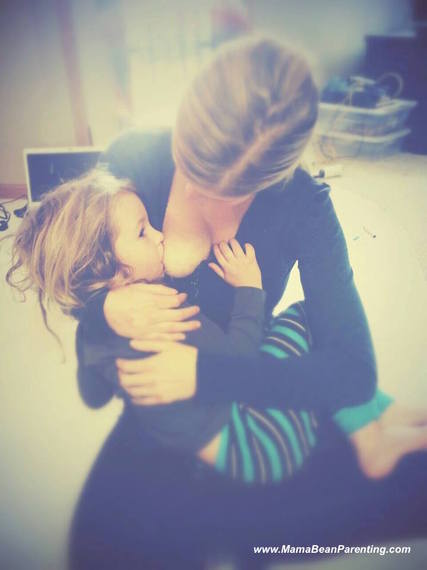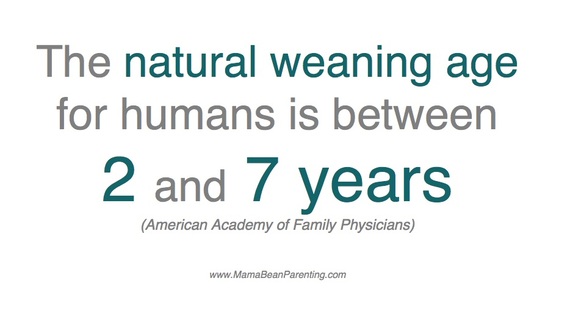So I published a post a few days ago -- you may have seen it -- about the time I nursed my 4-year-old on a flight.
Needless to say, it brought out the haters.
Even though my site is literally peppered with references to international health guidelines about breastfeeding, which all state very clearly that breastfeeding up to -- and beyond -- two years of age is the ideal... it seems that rather a sizeable chunk of people really are still very confused.
Bless.
You might think, well sure -- these people aren't exactly well versed in healthcare protocol or WHO directives! Of course they don't know the recommendations! Yet it's easy to assume, at the very least, that they have the brain cells to separate breastfeeding from drinking/eating in general, no?
For instance, when we see a child having a drink of water, we don't automatically assume that the child receives no other food or drink throughout the day, right?
And if we see a child enjoying a sandwich, we don't jump to the conclusion that the poor little thing isn't offered any other form of nutrition at all, do we?
So why -- why -- do people assume that babies, toddlers and children who are breastfed receive no other food or drink? Nil. Zip. Diddly squat. On what planet does that make even an ounce of sense?
I have literally lost count of the number of times that I have read the following comment under one of my pro-breastfeeding articles on HuffPost:
"Too old! Time for a sippy cup, please!! My child was eating solids and drinking cow's milk well before 4 years old!"
Dude -- my kid is well over sippy cups, you know... being 4 and all.
Do these people really think that a breastfed 4-year-old has lived on breast milk alone for four whole years? Breast milk is utterly amazing, but magical pixie juice it is not.
It is so easy to get lost in the comments of these pieces that seem to touch upon the last nerve of every Trump supporter in America. But really, there are so many people who understand. Who smile and nod. Who look at their own breastfed child of 1, 2, 3, 4, 5 and think -- yes... me too!
Because -- sorry haters -- we are many.
Earlier today, I was chatting with my friend about the onslaught of negativity towards my post. This friend also happens to breastfeed her 4 year old (you see, we really are everywhere). Anyway, my friend and I were chatting about why people take the idea of breastfeeding a 4-year-old and come up with a grand cry of "use a sippy cup!" My wise friend hit the nail on the head:
"The haters have only seen newborns breastfeeding, so they assume that's how it works all the time."
Man, she's right.
Breastfeeding has literally become a lost art. A hushed taboo reserved for the newest of souls and superseded by shiny packaged cow's milk in barely any time at all. Since when is human milk for human children seen as anything other than totally normal?
According to the World Health Organization, 36% of infants aged 0 to 6 months are exclusively breastfed. This means that a whopping 64% are not. The majority of children are not "optimally breastfed." It is barely any wonder that so many people have no idea at all as to what a normal and healthy nursing relationship looks like. Add to that, the fact that 71% of moms surveyed by Lansinoh felt a 2 year old would be "too old to breastfeed," it is really no surprise that people can't disassociate the mighty sippy cup from the lowly breast.
Yet nursing past infancy is not only biologically normal, it's also a medical recommendation that is supported worldwide. The American Academy of Family Physicians (AAFP), for example, state the following:
"As recommended by the World Health Organization, breastfeeding ideally should continue beyond infancy, but this is not the cultural norm in the United States and requires ongoing support and encouragement. It has been estimated that a natural weaning age for humans is between two and seven years. Family physicians should be knowledgeable regarding the ongoing benefits to the child of extended breastfeeding, including continued immune protection, better social adjustment, and availability of a sustainable food source in times of emergency...There is no evidence that extended breastfeeding is harmful to mother or child...If the child is younger than two years, the child is at increased risk of illness if weaned."
Which is why I'm writing this right now. And it's why my Facebook page exists, full of thriving breastfed children and proud, strong mothers. It's through sharing our stories and prioritising facts above misguided opinions that we encourage and empower other moms to nurse their babies, according to international health guidelines and human biological needs.
Nurse on, mamas, nurse on.
For more stories in celebration of motherhood and breastfeeding, join the Mama Bean village on Facebook today!
You can also find Mama Bean on Twitter.
This post originally appeared on Mama Bean Parenting.

